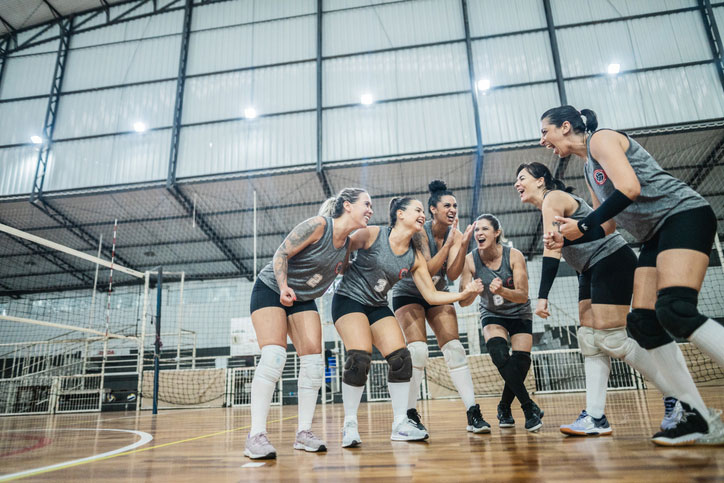Written by Allison Feldman

Do you have a deep interest in sports of all kinds and want to guide athletes to become even better — both mentally and physically? Sports psychology may be the right path for you.
Sports psychologists are in high demand in California across various settings, including professional sports teams, colleges and universities, private practices, and health and wellness organizations.
Scope of Practice for Sports Psychologists
Sports psychologists in California serve a diverse range of clients, from amateur athletes to professionals. Their primary focus is on improving mental performance, enhancing motivation, managing stress, and providing psychological support for athletes recovering from injuries. They work with athletes of all ages, backgrounds, and skill levels, and their work often involves collaboration with coaches, trainers, and other healthcare professionals.
Key Areas Of Focus:
- Performance Enhancement: One of the most common tasks for sports psychologists is helping athletes improve their performance. Using techniques such as visualization, goal setting, relaxation, and concentration exercises, sports psychologists can help athletes to overcome mental blocks, enhance focus, and maintain a positive mindset during competition.
- Mental Skills Training: Mental skills training is a fundamental part of a sports psychologist’s role. This includes teaching athletes strategies to manage anxiety, stay focused under pressure, and maintain emotional regulation. Athletes learn techniques like mindfulness, breathing exercises, and mental reframing to stay calm and composed in high-stress situations.
- Injury Recovery and Rehabilitation: Injuries affect more than an athlete’s physical health. Recovering from the mental impact of an injury is a large aspect of sports psychologists’ scope of practice. Sports psychologists help athletes cope with feelings of frustration, sadness, and anxiety related to injuries. They also work on promoting a positive mindset to speed up recovery and prevent mental setbacks.
- Team Dynamics and Communication: Sports psychologists often work with teams and coaches to improve group dynamics, communication, and cohesion. They may provide conflict resolution strategies and help athletes develop better relationships with teammates and coaches, including techniques that grow trust and unity among players of a team.
- Mental Health Support: In addition to performance-related issues, sports psychologists also address broader mental health concerns such as anxiety, depression, eating disorders, and other psychological challenges that can affect athletes. They provide counseling and therapy to help athletes navigate these issues and ensure that their mental well-being is maintained.
- Career Transitions: Many professional athletes experience difficulties transitioning out of sports when their careers come to an end. Sports psychologists often work with retired athletes to help them adjust to life after their sports careers, which may include finding new occupations and managing the emotional aspects of retirement.

Client Groups
- Professional and Collegiate Athletes: Working with elite athletes at the top levels of competition is a major part of a sports psychologist’s career. Athletes at this level may seek counseling to optimize performance, overcome mental barriers, or deal with the pressure of high-stakes competition.
- Amateur and Youth Athletes: Sports psychologists also work with young athletes who may face performance anxiety, self-esteem issues, or family pressure to succeed. They help these athletes manage stress and develop healthy attitudes toward competition.
- Recreational Athletes: Individuals participating in sports for leisure or fitness can benefit from sports psychology services as well. Recreational athletes may seek help with motivation, achieving fitness goals, or overcoming injury-related setbacks.
Salary Expectations for Sports Psychologists in California
California has the highest average salary in the United States for sports psychologists, falling behind only Alaska. The expectation for a sports psychologist salary in California can vary based on several factors, including education, experience, location, and their specific client group. California’s large economy and diverse sports industry offer many opportunities for professionals in this field, but salaries can differ by region (urban versus rural) and employment type (private practice versus sports teams).
- Entry-Level: The average salary for sports psychologists in California that are new to the field typically range from $60,000 to $80,000 per year. These individuals may work in less specialized settings, such as counseling centers or clinics, and may provide support to a broad range of athletes or sports enthusiasts.
- Mid-Career: With several years of experience, sports psychologists can expect to earn between $80,000 and $120,000 annually. These professionals may work with professional or collegiate athletes and may specialize in high-performance sports psychology or mental health services.
- Experienced or Senior-Level: Highly experienced sports psychologists, especially those working with top-level athletes or in private practice, can earn over $100,000 per year or more. Sports psychologists employed by professional sports teams, Olympic athletes, or large sports organizations tend to be at the higher end of the salary scale.

Factors Influencing Salary of Sports Psychologists in California
Geographic Location: In urban areas like Los Angeles, salaries are typically higher due to the higher cost of living and greater demand for specialized services. Rural areas, by contrast, may offer lower salaries but may still provide opportunities to work with emerging talent or youth athletes.
Clientele and Specialization: Working with professional athletes or high-profile teams can lead to higher salaries as the stakes in performance are higher. Sports psychologists who focus on niche areas, such as mental health counseling for athletes, may also earn higher wages due to the specialized knowledge required.
Education and Experience: Advanced degrees (such as a Ph.D. or Psy.D.) and extensive experience working in the field of sports psychology can also lead to higher salaries. Sports psychologists with expertise in a particular sport, or those who have worked with elite athletes, may have more earning potential.
Why Become a Sports Psychologist?
There are several compelling reasons why someone might want to pursue a career in sports psychology. Here are a few key motivations:
1. Passion for Sports and Helping Others
Sports psychologists often have a strong personal interest in athletics and a deep desire to help athletes perform at their best. This combination of passion for sports and the ability to make a meaningful impact on others’ lives is one of the main reasons people are drawn to this profession.
2. Job Satisfaction and Impact
Working as a sports psychologist offers the opportunity to make a real difference in the lives of athletes. Helping someone overcome mental barriers, recover from injury, or develop healthy coping strategies can be incredibly fulfilling. Many sports psychologists report high levels of job satisfaction due to the positive impact they can have on athletes’ mental and emotional well-being.
3. Diverse Work Environments
Sports psychologists have the flexibility to work in a variety of settings, including professional sports teams, universities, private practice, fitness centers, and research institutions. The diversity of work environments allows sports psychologists to customize their career to meet personal interests and goals.
4. Growing Field
The field of sports psychology is expanding, particularly as more athletes and teams recognize the importance of mental training in achieving peak performance. As awareness of mental health in sports grows, there is a rising demand for sports psychologists, creating job opportunities and career growth potential.
Educational Requirements
To become a licensed sports psychologist in California, students must complete a rigorous educational and training path. This typically involves obtaining a doctoral degree, completing supervised clinical hours, and passing a licensing exam.
Steps for education to become a sports psychologist in California:
1. Bachelor’s Degree
The first step in becoming a sports psychologist is earning a bachelor’s degree, typically in psychology, kinesiology, or a related field. While a bachelor’s degree alone is not sufficient to practice as a sports psychologist, it is the foundational step that sets the stage for further education.
2. Master’s Degree (Optional)
Some students may pursue a master’s degree in sports psychology or counseling psychology, which can provide a deeper understanding of the field and enhance their career prospects. While a master’s degree is not always required for acceptance into doctoral programs, it can be a useful stepping stone. There are many sports psychology masters programs in California to choose from.
3. Doctoral Degree
The most common route to becoming a sports psychologist is to earn a Ph.D. or Psy.D. in psychology, with a specialization in sports psychology. These programs generally take 5-7 years to complete and include both coursework and extensive research in the field. A doctoral degree is necessary to obtain a California psychology license.
4. Internship and Supervised Experience
Aspiring sports psychologists must complete a supervised internship or practicum during their doctoral program. This provides hands-on experience working with athletes and developing practical skills in sports psychology.
5. Licensing
After earning a doctoral degree, candidates must pass the Examination for Professional Practice in Psychology (EPPP) to obtain licensure as a psychologist in California. They also need to complete post-doctoral supervised hours before they can fully practice independently.
6. Continuing Education
Even after licensure, sports psychologists are required to complete continuing education to maintain their license. This may include workshops, certifications, and other professional development opportunities to stay current in the field.

Sports psychologists in California play a crucial role in helping athletes reach their full potential and maintain their mental health. With a strong demand for mental performance services across various levels of competition, this career offers a blend of intellectual challenge, job satisfaction, and the opportunity to make a meaningful difference.
2023 US Bureau of Labor Statistics salary and employment figures reflect state data, not school-specific information. Conditions in your area may vary. Data accessed December 2024.
